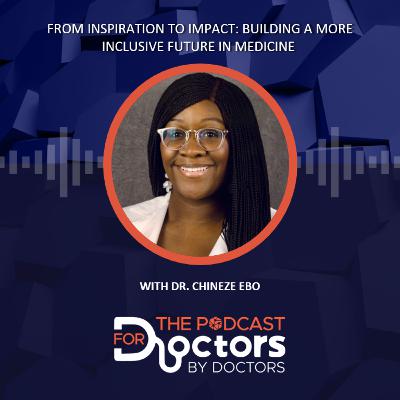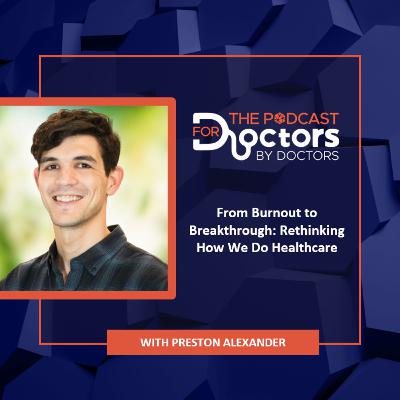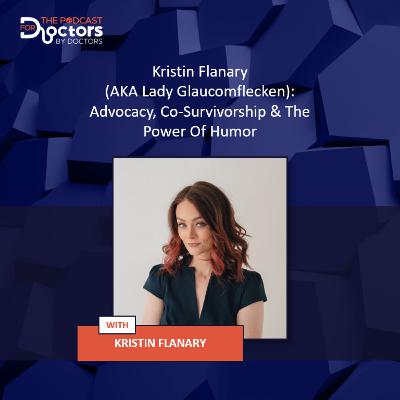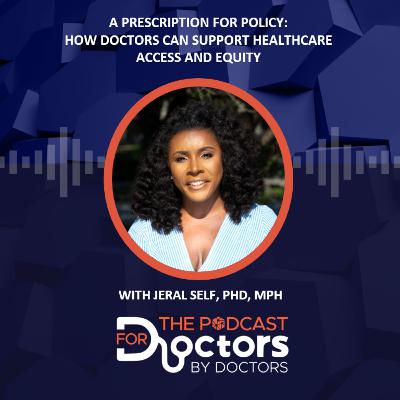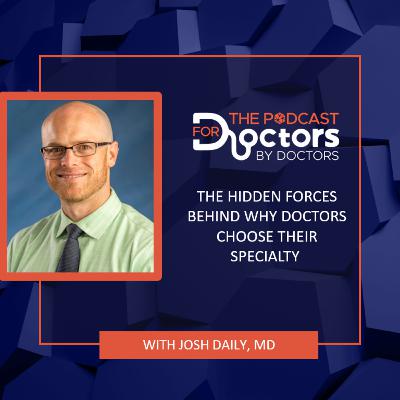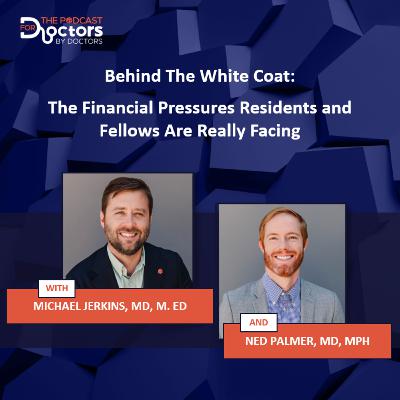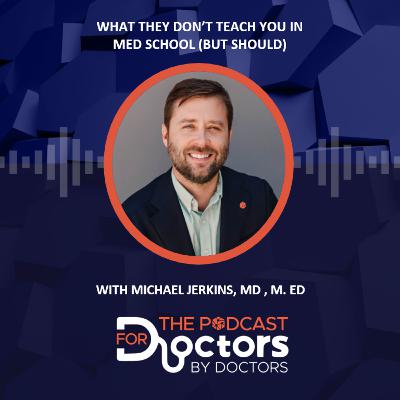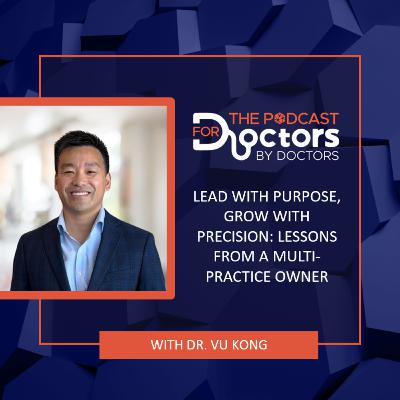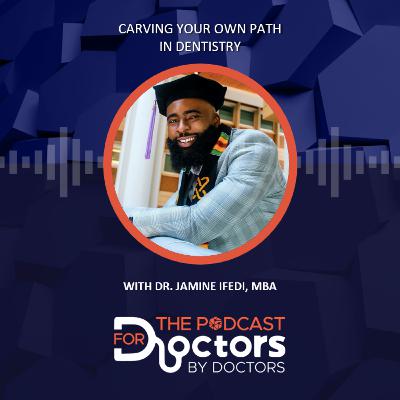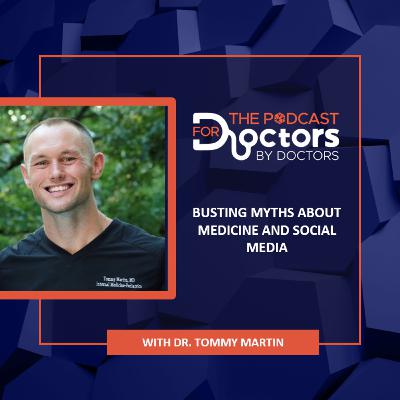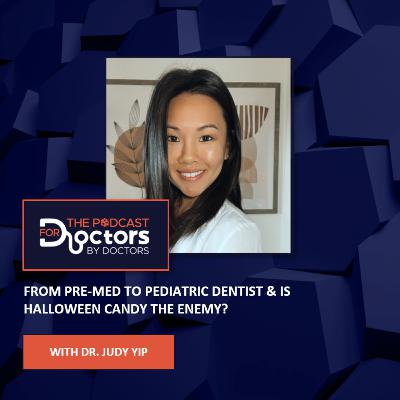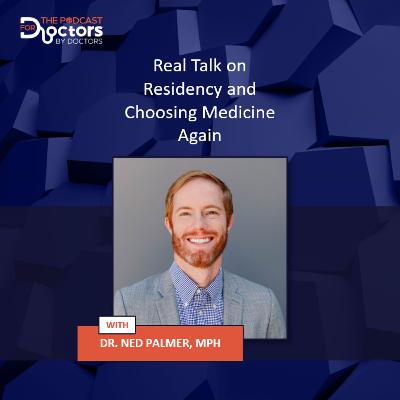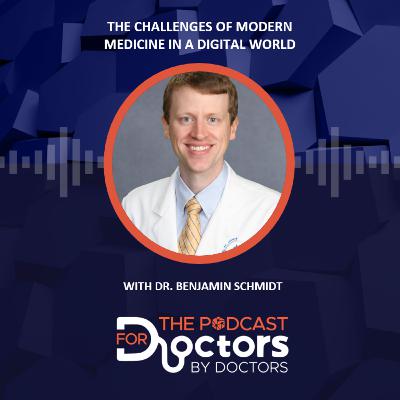Discover The Podcast For Doctors (By Doctors)
The Podcast For Doctors (By Doctors)

The Podcast For Doctors (By Doctors)
Author: Dr. Michael Jerkins and Dr. Ned Palmer
Subscribed: 1Played: 1Subscribe
Share
© Dr. Michael Jerkins and Dr. Ned Palmer
Description
Join Dr. Michael Jerkins and Dr. Ned Palmer, practicing physicians and co-founders of Panacea Financial, a national financial platform for doctors, as they have real talk on what matters to doctors and their lives.
25 Episodes
Reverse
Pediatric endocrinologist, mentor, and co-founder of NextGen Pediatricians, Dr. Chineze Ebo joins Dr. Ned Palmer to share how early exposure to medicine through her mother, an OB-GYN doctor, sparked a career dedicated to long-term patient care. She opens up about the moment she knew pediatric endocrinology was the right path, the joy of seeing patients thrive, and the unique challenges facing this small but vital specialty. How can mentorship completely shift the trajectory of a young doctor’s career? And what happens when diversity in medicine goes from a talking point to a reality? They dig into how mentorship can transform opportunities for underrepresented minority physicians, why diversity is a driver of better patient outcomes, and the systemic shifts needed to attract more specialists to pediatric care. From swapping career-shaping stories to throwing out bold ideas for the future of medicine and bonding over their shared (and admittedly controversial) dislike of Cincinnati chili; this conversation is as real as it gets. Whether you’re a doctor, med student, or just curious , you’ll leave inspired, informed, and maybe a little hungry… just not for chili. Panacea Financial is not a law firm and provides no legal advice of any kind whatsoever. The information regarding legal matters shared on this website is provided for your private use, and does not constitute legal advice or substitute for the advice of an attorney. If you require legal advice about a specific matter or question, you should consult with an attorney of your choosing or connect to Panacea Legal Services panacea.legal.
What do clunky insurance networks and subscription-style doctor care have in common? According to Preston Alexander, they’re both part of the same fixable puzzle. Healthcare advocate, writer, and author of The Healthcare Breakdown, Preston joins Dr. Michael Jerkins to explore where the U.S. healthcare system is broken and the quiet, practitioner-led shift already underway. They dig into how insurance-driven incentives frustrate doctors and patients, why employers hold untapped power to change costs, and the growing appeal of subscription models like direct primary care. Preston shares how technology can make care more direct and transparent, how large health systems’ misaligned incentives hold progress back, and why physician voices are essential in decision-making. From legislative barriers to the business skills doctors need to thrive, this conversation blends big-picture strategy with actionable ideas for building patient-centered, sustainable practices. Whether you’re a physician, employer, or simply curious about what’s driving healthcare costs, you’ll walk away with a clear-eyed view of what’s broken and what’s working.
What do boy bands, burnout, and bedside manner have in common? According to Dr. J Mack Slaughter—more than you think. In this episode, emergency medicine physician, musician, and social media creator Dr. J Mack joins Dr. Michael Jerkins to unpack his unlikely path from pop performer to practicing medicine, and how creativity still fuels his career today. Dr. J Mack opens up about what led him to leave the entertainment industry, start over as a pre-med student, and ultimately find a way to merge both passions through his nonprofit, Music Meets Medicine. From the emotional toll of COVID-19 to his advocacy around EM residency reform and healthcare worker mental health, he shares how creating content online has helped him reclaim his voice and fight burnout, while educating the public along the way. We explore the broken incentives in healthcare, how profit-driven systems are failing both doctors and patients, and why giving doctors the tools to speak out is more important than ever. Whether you're a clinician craving inspiration or just someone who wants to understand the person behind the white coat, this episode hits all the right notes.
Writer, advocate, and co-creator of the Glaucomflecken universe, Kristin Flanary joins the show to explore the unexpected intersections of humor, healthcare, and co-survivorship. Known online as Lady Glaucomflecken, Kristin shares her journey from casual Twitter banter to public advocacy after performing life-saving CPR on her husband, physician and comedian Dr. Will Flanary, during his sudden cardiac arrest. In a system designed to center only the patient, where does that leave the partner who’s living through the trauma too? And what happens when caregivers are treated as accessories to recovery rather than humans navigating shock, PTSD, and grief of their own? Kristin reflects on the emotional toll of being a co-survivor, the role of humor in healing, and why changing the language we use in medicine is more powerful than we realize. We also unpack what it's like to build a life around a doctor’s schedule, how med school and training affects more than just the trainee, and why prestige in medicine is often overrated. This episode shines a light on the forgotten patients, while challenging doctors to approach families with more intention and empathy. If you’ve ever struggled to be seen in the healthcare system or want to better understand the people who stand beside the patient, this one is for you.
Health policy researcher and advocate Dr. Jeral Self joins host Dr. Michael Jerkins to explore one of the most overlooked yet impactful forces in healthcare: policy. With over 17 years of experience, Dr. Self shares what most people, and even many doctors, misunderstand about Medicaid, and why that matters more than ever. From school-based health initiatives and rural hospital struggles to the rapid rise of telehealth, this episode digs into the real-world effects of policy decisions and the importance of doctor involvement beyond the clinic. Dr. Self also opens up about how motherhood reshaped her perspective on care, and why advocacy can’t be something we only take on after burnout. How do we make sense of a system as complex as Medicaid? Where can doctors make a difference without a policy degree? And how do we keep patients, especially the most vulnerable, at the center of all this? Whether you’re new to health policy or already active in advocacy, this episode is a thoughtful, personal, and practical look at how doctors can be agents of change in a system that desperately needs it. The views expressed by Dr. Self in this podcast are solely her own and do not reflect the opinions or positions of her employer.
Pediatric cardiologist and educator Dr. Josh Daily joins the show to unpack one of the most pivotal and pressure-filled decisions in medicine: choosing your specialty. From the subtle influence of faculty feedback to the emotional weight of tough rotations, Dr. Daily shares how emotional and cognitive biases often shape career paths more than we realize. In a system that expects clarity before exposure, how can students make informed, fulfilling choices? And what happens when a choice made under pressure leads to burnout later on? Dr. Daily reflects on his own journey, the power of mentorship, and why matching your specialty to your values matters more than chasing prestige. This episode dives deep into the hidden forces behind specialty selection; from confirmation bias and emotional fatigue to the role of coaching, aptitude testing, and systemic reform. We also explore how AI and wearable tech may influence the future of care and whether they’ll help or hinder the next generation of physicians. If you’ve ever questioned your path in medicine (or are guiding someone through theirs), this one’s for you. Tune in for practical insights, candid reflections, and a conversation that challenges the status quo of medical training.
What’s it really like to train in medicine today? Internal medicine-pediatrics physicians Michael Jerkins, MD, M.Ed and Ned Palmer, MD, MPH dive into the results of the Panacea Financial 2025 Annual Residents and Fellows Survey, which captured the voices of nearly 500 medical trainees across the country. The findings? Over half of respondents reported feeling extremely financially stressed—and the stories behind that number paint a deeper picture of the challenges facing today’s doctors-in-training. From rising living costs and ballooning student debt to the emotional weight of working long hours while living paycheck to paycheck, Drs. Jerkins and Palmer explore the toll this financial pressure is taking on the future of medicine. They unpack why student loan stress jumped 26% in just one year, what it means when 1 in 3 trainees wouldn’t choose medicine again, and how instability is hitting certain specialties the hardest. What can we learn from the doctors who are still in the thick of it? How does financial stress impact patient care and what could a better training system actually look like? With data, personal insights, and a dose of realism, this episode is a candid look at what’s working, what’s broken, and why meaningful reform matters now more than ever. Tune in to hear what today’s residents and fellows really want you to know.
Internal medicine-pediatrics physician, educator, and Panacea Financial co-founder Dr. Michael Jerkins joins us as a guest to share his journey through medicine. From his early days in Memphis to residency in Cincinnati, Dr. Jerkins experienced firsthand the pressures of medical education, ballooning student debt, and the emotional toll of ICU rotations. But what if the system could be different? What if medical school were shorter, more affordable, and designed for how we actually learn today? In this episode, Dr. Jerkins opens up about the parts of his training that now feel obsolete, the lessons hidden inside six-figure student loans, and why AI might just be the assistant doctors didn’t know they needed. How do you stay human in a system that sometimes forgets you are one? What would you change if you had a magic wand—and what does ska music have to do with any of it? Dr. Jerkins shares honest reflections, practical ideas, and plenty of humor in a conversation that reminds us why medicine needs both heart and reform. Tune in for a thoughtful look at what it takes to practice with intention in a world that’s constantly evolving.
Dentist, practice owner, and entrepreneur Dr. Vu Kong joins us to share his remarkable journey into dentistry and business ownership. Born in a refugee camp in Thailand, Dr. Kong originally planned to pursue mechanical engineering before his father—a former dentist—encouraged him to consider a different path. After graduating amidst a financial crisis, limited opportunities led him from Michigan to Illinois, where he and a friend began conceptualizing a practice just six months out of school; one that would eventually become High Point Dentistry. So how do you go from launching a practice to building a multi-location business? What lessons come from selling it all—and starting again? And how do you lead with purpose while raising a family? Dr. Kong opens up about growth, sacrifice, and what he’s learned about leadership, culture, and data along the way. Tune in for an honest look at what it takes to grow smarter, not just bigger.
Dentist, practice owner, and podcast host, Dr. Jamine Ifedi, MBA, joins us to share his journey into dentistry and what he's learned along the way. From taking all the entrance exams (yes, the MCAT and DAT) to choosing dentistry based on test scores, Dr. Ifedi's path was anything but traditional. After hands-on experience in a variety of specialties, a deep dive into geriatrics as a travel dentist, and early dreams of practice ownership, he eventually opened Empire Dental Group in Charlotte, NC. How do you step into practice ownership only a year and a half after graduating? How can doctors transform a white coat into a lasting financial legacy? Can you still buy a practice if you have student loans? Dr. Ifedi, a true community pillar, shares his time and knowledge in this episode and in his community to uplift future dental leaders. Tune in to hear how he accomplished it all.
Internist/pediatrician and social media influencer Dr. Tommy Martin shares his perspective on challenges in medical school, the importance of authenticity as a content creator, and the unexpected controversies of medicine in the world of social media. In this episode, he dives into the biggest misconceptions about doctors, the importance of work-life balance, and why filling your own cup makes you a better doctor. How does social media shape public perception of medicine? Why do people expect doctors to have no life outside of work? And what’s the deal with the great peanut butter debate? Dr. Tommy Martin unpacks these topics while sharing insights on health, wellness, and medical education. Tune in for an honest, insightful, and sometimes surprising conversation about life in and beyond the hospital.
Pediatric dentist and social media content creator Dr. Judy Yip shares her journey from pre-med to pediatric dentistry in this episode. She opens up about her decision to pivot from the MCAT to chasing her childhood dream of becoming a dentist and how a state-based student loan forgiveness program helped ease the financial burden. Is the DAT harder than the MCAT? Why is pediatric dentistry such a fulfilling career? How can pediatricians better educate parents on oral health? Dr. Judy Yip unpacks these questions while offering practical advice for parents and future dentists alike. Tune in for a fun and insightful conversation about following your passion, tackling dental education, and making kids smile!
In this special episode, Chief Operating Officer and Co-Founder of Panacea Financial and practicing physician, Dr. Ned Palmer, MPH, takes the guest seat to share his unique journey through medical training. He and Dr. Michael Jerkins dive into the often-overlooked realities of becoming a doctor—from the evolving role of medical ethics in education to the complexities of student debt and inefficiencies of residency training. If you knew the financial burden of medical school, would you still pursue it? Is the current structure of residency training efficient or disparaging? Can integrating ethics into medical education create more well-rounded physicians? Join us as Dr. Palmer reflects on the shifting role of doctors in patient care, the haunting moments from his training, and even his past life as a bicycle cab driver. This is a conversation you won’t want to miss!
Board certified gastroenterologist, social media influencer, author, and educator, Dr. Benjamin Schmidt (Doc Schmidt), combines his medical expertise with a dose of humor to navigate the evolving landscape of healthcare. In this episode, he explores the impact of social media on patient trust, the rise of self-diagnosis fueled by AI, and the growing frustrations with insurance red tape.
Can humor and education coexist in healthcare? How do doctors balance online presence with patient care? Why are younger patients facing rising rates of colon cancer, and what can be done? Doc Schmidt unpacks these issues while reflecting on his journey as a doctor and the takeaways from his viral success. Tune in for an engaging conversation that bridges medicine, technology, and humanity.
Kenedy Dawson, a fourth-year medical student and a passionate advocate for her peers takes us behind the scenes of her journey through the 2025 Match process, offering candid insights into what it’s like navigating this pivotal moment in her career.
Are virtual interviews enough to truly evaluate residency programs? What changes could make the Match process more student-friendly? Kenedy and Dr. Jerkins compare their experiences, exploring the challenges and opportunities faced by the 40,000+ medical students who embark on this life-changing path every year.
Dr. Graham Walker, an emergency physician, software developer, and the visionary behind MDCalc, shares how he bridges the gap between technology and medicine. Dr. Walker delves into the evolving dynamics of healthcare, highlighting generational shifts among doctors and the rise of employed physicians over traditional practice ownership.
Are healthcare providers' passion and dedication being taken advantage of? How has COVID reshaped the mindset of a new generation of doctors? And is there a balance between personal fulfillment and professional devotion in modern medicine? Dr. Palmer, Dr. Jerkins, and Dr. Walker explore these notions and more in this thought-provoking episode.
Internist, professor, editor-in-chief, and author, Dr. Danielle Ofri, a prominent voice in the medical world, delves into the complex dynamics of hierarchy in medicine, the emotional burdens that doctors often bear, and the profound impact that active listening can have on doctor-patient relationships. Can humility help prevent medical errors? Are we stretching providers too thin? Can active listening not only improve relationships but overall patient care as well? Tune in for a thought-provoking conversation that challenges the way we approach healthcare, communication, and compassion in the medical field.
Can market and social norms work to your benefit during negotiations? What are common mistakes to avoid? How do you determine your worth as a doctor? Dr. Josh Daily, a pediatric cardiologist and program director, and Jillian Vestal, a licensed attorney who specializes in doctor contracts explain the struggle many doctors face during contract negotiation and how to equip yourself for more advantageous outcomes. Dr. Daily and Jillian share practical tips for doctors to utilize during this phase.
The information regarding legal matters shared on this website is provided for your private use, and does not constitute legal advice or substitute for the advice of an attorney. If you require legal advice about a specific matter or question, you should consult with an attorney of your choosing or connect to Panacea Legal panacea.legal.
Co-founder and Chief Medical Officer at Knownwell, Dr. Angela Fitch discusses the importance of recognizing obesity as a chronic disease, the insurance barriers surrounding access to medication for patients and how the Treat and Reduce Obesity Act (TROA) could solve the approach to treatment across the nation. Would the passing of TROA eliminate the issues surrounding a carve-out insurance plan? What will the continuation of selling compounded versions of the patented weight loss drugs mean when shortages end? Dr. Fitch, who is board certified in internal medicine, pediatrics and obesity medicine walks us through the challenges in obesity care for clinicians and patients alike and how she hopes to implement change.
Med-Peds hospitalist, residency program director, and PhD candidate Dr. Ben Kinnear discusses how time-variable training impacts learning amongst students and residents and the importance of evolving medical training to ensure residents are prepared to provide high-quality care for patients. Is time-variable learning the best path forward for quality medical training? Will unionization of hospitals become the norm in the foreseeable future? Dr. Kinnear walks us through his thoughts on competency-based learning and how it can lead to more effective results for learners.
Comments
 United States
United States

